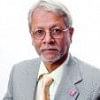Books, power and flyovers
There is no country in the world that gives away more than 33 crore books on New Year's Day, and that too for free, not even in the richest of the rich countries. The difficulty is not only in printing so many different books on different subjects of levels one to ten, but also in the perhaps more demanding and humongous task of distributing them to almost 4.5 crore students across the country. Bangladesh, thanks to the innovative initiative of a thinking head-straight education minister Nurul Islam Nahid and his supportive ministry, aided by a dedicated team of writers, editors, printers, teachers and principals, have been doing just that for now for a number of years. The joy on the face of the children and the patriotism instilled in their soul is worth the while and the entire project by all means a wise investment. Education along with co-curricular activities can nurture in the young self-respect and independence, compassion for and a will to help others, knowledge of and respect for adherents of all beliefs and cultures, and the most important, potency to change for the better. There is little doubt that education indeed is power.
The power sector too has made progress in leaps and bounds. The initial criticism for allotting contracts for quick rental power supply has subsided in the face of development meanwhile of the larger permanent stations that has taken Bangladesh's total power from 3300 megawatt in 2008 to plus-12000mw in 2015, a steep journey in just seven years. This hitherto considered improbable progress has again been possible by a catalytic government policy taken forward by an agile power (state) minister Nasrul Hamid Bipu and his sincere ministry officials, buoyed by the zealous dedication and hard work of those concerned in both the public and the private sectors.
Rarely in Bangladesh has the private-public-partnership worked with such fruition, and the amalgamation of the joint efforts remains today a model for the rest of the developing world. Bangladesh Power Development Board (BPDB) and its subsidiaries for power generation, the Power Grid Company of Bangladesh Ltd. (PGCB) for 'wheeling of energy from BPDB power stations and generation companies to distribution entities', Dhaka Power Distribution Company Limited (DPDC) and DESCO for distribution in Dhaka and Narayanganj, and Bangladesh Rural Electrification Board (REB) through rural electric cooperatives called Palli Bidyut Samity, as well as private sector operators such as giants Summit power – they all deserve kudos.
If truth be told, the success of power generation has not fully reached the households because of limitations of the distribution companies, but the obstacles they face are not merely anthills. The appreciation of a grateful nation and continued support to generation, transmission and distribution will be the right gear to accelerate the enviable programme to enable Bangladesh fly over all hurdles.
One major hurdle in our bid to fly remains the traffic jam, in not only the capital city but in many key points all over the country. The time consumed in not travelling is adding to our costs at personal, corporate and state levels. In the 1990s, flyovers were peddled as hopes for a citizenry bogged down by congestion. The experience on Mayor Hanif and Kuril flyovers are pleasant, albeit subjective, but the common citizens' hopes for traffic-reduced roads were substantially reduced since Moakhali and Banani flyovers faltered badly; the jam was only elevated to upper deck. Several upcoming flyovers are occupying major roads in Dhaka for months now, and movement along those roads is terrible to say the least.
Despite adding to the percentage of city roads, according to traffic engineers and planners, flyovers do not and cannot solve mobility problems because there are other major factors responsible for the way traffic moves in a city and around the country. The number of vehicles and tailbacks will continue to increase, adding to the woes of people on the street. Dedicated lanes for bus movement, planned flyovers (implying the ones constructed are not), judicious employment of the 3 R's, rail-road-river way, installation of Mass Rapid Transit (MRT) and Bus Rapid Transit (BRT) could evolve more fruitful means of achieving the end. ('Flyovers to become burden for Dhaka: Experts', Online Desk Prothom Alo, 17 Oct, 2015)
That brings us to the point of proper education. Whatever facilities are provided, a system will fail if the controller and user are not sincere to the purpose. A case in point, say, is the 'bus lane'. If bus drivers do not abide by it and drivers of other vehicles encroach on it, both of which are very much likely given the current practice, and police in desperation or otherwise look the other way, mayhem will be the order. Hence, true all-round education that can inculcate self-discipline, sincerity, and steadfastness is required. There lies the importance of the books. Consequently, the results are there for all to see in the mammoth undertaking of the power sector.
We can be powered by education, but we cannot fly off to reach higher measures of success unless that education is meaningful and effective.
In the New Year, let that be our resolve. May you all come to pass 2016 with greater fruition on which to build a better Bangladesh! Happy New Year!
The writer is a practising Architect at BashaBari Ltd., a Commonwealth Scholar and a Fellow, a Baden-Powell Fellow Scout Leader, and a Major Donor Rotarian.

 For all latest news, follow The Daily Star's Google News channel.
For all latest news, follow The Daily Star's Google News channel. 



Comments